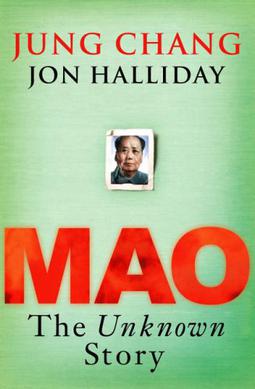
Publisher: Random House
Publication date: June 2, 2005
ISBN 0-224-07126-2
节选: "In his talks with the Soviets he displayed a rather casual attitude toward the bomb. On one occasion, he startled Soviet foreign minister Andrei Gromyko by asking where the new socialist capital should be built after a nuclear war, implying that Moscow would be history. On the other hand, China would be perfectly prepared to fight a nuclear war with America alone and endure a first strike: “All it is is a big pile of people dying.” In his view, if half of China’s population, then some 800 million, were wiped out in a nuclear confrontation, so be it. That would leave 400 million. "
"In his talks with the Soviets he displayed a rather casual attitude toward the bomb. On one occasion, he startled Soviet foreign minister Andrei Gromyko by asking where the new socialist capital should be built after a nuclear war, implying that Moscow would be history. On the other hand, China would be perfectly prepared to fight a nuclear war with America alone and endure a first strike: “All it is is a big pile of people dying.” In his view, if half of China’s population, then some
800 million, were wiped out in a nuclear confrontation, so be it. That would leave 400 million. "---------------------------------------------------------------------------------------------------------------
David S. G. Goodman, Professor of Contemporary China Studies at the University of Technology, Sydney, wrote a sharply critical review of Chang and Halliday's book in The Pacific Review
. He suggested that there is an implied argument in Mao: The Unknown Story that there has been "a conspiracy of academics and scholars who have chosen not to reveal the truth" - an argument which he likened to the conspiracy theorizing of the
The Da Vinci Code. Goodman argued that "the 'facts' in The Da Vinci Code are about as reliable as those to be found in...Mao: The Unknown Story." Goodman argued that the style of writing was "extremely polemic" and that the book could even be thought of as a "form of fiction" where "a strong narrative" is "a substitute for evidence and argument." Goodman was highly critical of Chang and Halliday's methodology and use of sources as well as several of their specific conclusions, claiming that their focus on vilifying Mao led them to write "demonography" rather than objective history and biography.






